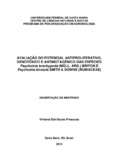| dc.creator | Frescura, Viviane Dal Souto | |
| dc.date.accessioned | 2012-10-31 | |
| dc.date.available | 2012-10-31 | |
| dc.date.issued | 2012-01-17 | |
| dc.identifier.citation | FRESCURA, Viviane Dal Souto. Evaluation of the antiproliferative, genotoxic and antimutagenic potential of the species Psychotria brachypoda (Müll. Arg.) Briton e Psychotria birotula Smith & Downs (Rubiaceae). 2012. 74 f. Dissertação (Mestrado em Ciências Biológicas) - Universidade Federal de Santa Maria, Santa Maria, 2012. | por |
| dc.identifier.uri | http://repositorio.ufsm.br/handle/1/4844 | |
| dc.description.abstract | Species of the genus Psychotria L. are used in Brazilian folk medicine as tea, however, their indiscriminate and uncontrolled can cause more harm than good to health. It is important to understand these plants, from their cellular levels to the action on living organisms, and for monitoring toxic substances allelopathic bioassays are widely used with plant species as the target organisms. This study aimed to evaluate the genotoxic, antiproliferative and antimutagenic potential of infusions of Psychotria brachypoda (Muell. Arg.) Briton and Psychotria birotula Smith & Downs on the cell cycle of Allium cepa L., in addition to analyzing the antiproliferative and genotoxic potential on the germination on seeds and cell cycle of Eruca sativa Mill. For this, dried leaves were used to prepare extracts in two concentrations for each species: 5g.L-1 and 20g.L-1, using distilled water as a negative control and glyphosate 3% as a positive control. For the study, antiproliferative on the germination (allelopathic potential) variables were analyzed: total number of germinated seeds, seedling root length, index of germination rate, and germination percentage. To evaluate the genotoxic, antiproliferative and antimutagenic potential, both for the test with A. cepa and with E. sativa were analyzed mitotic index and the number of chromosomal alterations. The extracts of P. brachypoda have no genotoxic potential, though the extracts of P. birotula possess genotoxic potential on the A. cepa cell cycle and the extracts of P. brachypoda and P. birotula showed no antimutagenic potential, no entanto, apresentaram genotoxic, and antiproliferative potential on the germination and cell cycle E. sativa. | eng |
| dc.description.sponsorship | Coordenação de Aperfeiçoamento de Pessoal de Nível Superior | |
| dc.format | application/pdf | por |
| dc.language | por | por |
| dc.publisher | Universidade Federal de Santa Maria | por |
| dc.rights | Acesso Aberto | por |
| dc.subject | Antiproliferativo | por |
| dc.subject | Genotóxico | por |
| dc.subject | Alelopático | por |
| dc.subject | Psychotria brachypoda | por |
| dc.subject | Psychotria birotula | por |
| dc.subject | Antiproliferative | eng |
| dc.subject | Genotóxic | eng |
| dc.subject | Allelopathic | eng |
| dc.subject | Psychotria brachypoda | eng |
| dc.subject | Psychotria birotula | eng |
| dc.title | Avaliação do potencial antiproliferativo, genotóxico e antimutagênico das espécies Psychotria brachypoda (Müll. Arg.) Briton e Psychotria birotula Smith & Downs (Rubiaceae) | por |
| dc.title.alternative | Evaluation of the antiproliferative, genotoxic and antimutagenic potential of the species Psychotria brachypoda (Müll. Arg.) Briton e Psychotria birotula Smith & Downs (Rubiaceae) | eng |
| dc.type | Dissertação | por |
| dc.description.resumo | Espécies do gênero Psychotria L. são utilizadas na medicina popular brasileira, na forma de chá, porém, o uso indiscriminado e sem controle pode causar mais danos à saúde do que benefícios, sendo importante o conhecimento dessas plantas, desde os níveis celulares bem como a ação sobre os organismos vivos. Para monitorar substâncias tóxicas e alelopáticas são muito utilizados ensaios biológicos com espécies vegetais como organismos alvo. O presente trabalho objetivou avaliar o potencial antiproliferativo, genotóxico e antimutagênico de extratos das folhas de Psychotria brachypoda (Müll. Arg.) Briton e Psychotria birotula Smith & Downs sobre o ciclo celular de Allium cepa L., além do potencial antiproliferativo e genotóxico sobre a germinação de sementes e ciclo celular de Eruca sativa Mill. Para isto, foram utilizadas folhas secas para preparar extratos em duas concentrações para cada espécie: 5g.L-1 e 20g.L-1, sendo utilizada água destilada como controle negativo e o glifosato 3% como controle positivo. Para a análise do potencial antiproliferativo sobre a germinação (potencial alelopático) analisou-se as variáveis: número total de sementes germinadas, comprimento das raízes das plântulas, índice da velocidade de germinação e porcentagem de germinação. Para avaliação do potencial genotóxico, antiproliferativo e antimutagênico sobre o ciclo celular, tanto para o teste com A. cepa quanto com E. sativa foram analisados o índice mitótico e o número de alterações cromossômicas. Os extratos de P. brachypoda não apresentaram potencial genotóxico, já os extratos de P. birotula foram genotóxicos sobre o ciclo celular de A. cepa. Os extratos de P. brachypoda e P. birotula não apresentaram potencial antimutagênico, no entanto, demonstraram potencial antiproliferativo genotóxico sobre germinação e ciclo celular de E. sativa. | por |
| dc.contributor.advisor1 | Tedesco, Solange Bosio | |
| dc.contributor.advisor1Lattes | http://lattes.cnpq.br/2541303074261787 | por |
| dc.contributor.referee1 | Silva, Antonio Carlos Ferreira da | |
| dc.contributor.referee1Lattes | http://lattes.cnpq.br/9520096764579199 | por |
| dc.contributor.referee2 | Canto-dorow, Thais Scotti do | |
| dc.contributor.referee2Lattes | http://lattes.cnpq.br/5292365079708795 | por |
| dc.creator.Lattes | http://lattes.cnpq.br/7495074891068176 | por |
| dc.publisher.country | BR | por |
| dc.publisher.department | Ciências Biológicas | por |
| dc.publisher.initials | UFSM | por |
| dc.publisher.program | Programa de Pós-Graduação em Agrobiologia | por |
| dc.subject.cnpq | CNPQ::CIENCIAS BIOLOGICAS | por |


